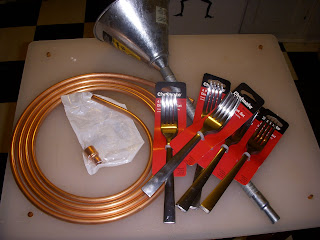For my fourth bread log, rather than make another rustic bread variety, I decided to skip ahead a few formulas to Roasted Potato Bread. This was a definite departure from the past loaves using a different preferment, pate fermentee, part whole wheat flour, and the first substantive addition I've used, potatoes.
Of course I have additions in bread before, olives and garlic, herbs and grains, but these additions predominately add flavor or texture and are seldom (in my experience) incorporated at the beginning of the mix, nor do they generally represent a substantial percentage of the overall flour weight of the bread. Roasted potato bread is both of those things. I baked Yukon Gold potatoes the evening before the bake and cut/smashed them into smallish pieces. I took Hamelman's suggestion of roasting (as opposed to boiling) the potatoes which yielded not only a more intense potato flavor, but also helped to control the water content they added to the mix.
Apart from the spuds the formula only calls for 61% hydration, which in any ordinary bread would be very stiff. Because I was unsure of how fast the potatoes would part with their moisture, I tweaked the formula adding a 20 minute autolyse after reaching full incorporation to allow them extra time to work their magic. After that I added the salt, yeast, and pate fermentee, and it was back to a more or less normal bake!
Pate fermentee, in some ways is the most basic of preferments. In a bakery setting it would literally be old dough left over from yesterdays mix. For those of us not baking on a daily basis we make it from scratch, but it's not an onerous process. It's hydration is somewhere between the ultra-stiff Biga and the liquid Poolish, but it differs from both in one important addition: Salt. Anywho, on with the pictures, beginning with said pate fermentee!
-
-
Pate fermentee at hour 16.
-
-
Here is the dough merrily autolysing.
-
-
This is the process of making a fendu loaf. You bisect the loaf before putting it in the proofing basket. Having created such a strong weak point during the shaping causes the loaf to split along that fault during it's ovenspring . . . or at least that's the intention ;). Fendu faildu:
-
-
In another big change from my previous bakes, I got all Macguyvery on my oven and rigged up a contraption for helping steam my bread.
Here was my process up until now: preheat my steel pan in the oven, boil some water in the electric kettle, after loading the bread splash some of the boiling water into the pan and close the door of the oven as fast as I could. As you would imagine this is less than ideal. The pan itself doesn't have much mass, and so it would only create a small amount of steam before it's temp dropped below the boiling point. What's more the vast majority of the steam it did create would just come right out the open oven door.
My new setup bypasses both of those issues. For the mass I bought some cheap stainless steel silverware. Stainless steel is really not ideal, as its poor conductivity causes it to cool down very quickly, but it has the advantage of not rusting (like iron) or possibly shattering (like rock) and there is less risk of odd fumes if used scrap metal. To help route the water into my steam pan I ran flexible copper tubing through the oven vent at the rear of the cooking range, to which I added an adapter to fit a funnel, and VOILA! I can now pour the boiling water straight into the steam pan with the oven door closed :).
These photos detail the process:
-
-
Lastly here are some pictures of the batard (oval loaf) in process, and the crumb for the bread
-
-
This bread was VERY tasty and a nice change of pace from the last few loaves. I however was a bit disappointed in the overall volume of the loaf, and after reviewing some resources online I think that I am simply under-mixing a bit. To test that theory I'm going to be making this bread again tomorrow and I'm going to up my mix time by 50% and add a second cutting of the dough on the bench. I am also going to add roasted garlic and thyme. I know this may well invalidate my mixing experiment, but it will be tasty none-the-less. It also gives me a second crack at a fendu boule. I'll post the results here so check back in a few days!
Here are the details from the bake:
Room Temp: 70.4
Water Temp: 85.8
Flour Temp: 71.8 (WW) & 70.2 (BF)
Preferment Temp: 71.4
Potato Temp: 72
Final Temp: (I forgot to take this . . . fail)
Autolyse: 20 min
Mix: 3 minutes on speed 2, followed by cut on bench, finished with 3 minutes on speed 2
Bulk Fermentation: 1.5 hours with one fold at 20 minutes and one at 55
Bench Proof: shape, 20 minute rest, shape, 75 minutes
Bake: ~35 minutes @ 450 degrees
Steam: 1/3rd cup for the batard with light misting and pre-steam, 1/2 cup for the boule w/same
Thanks for reading!















No comments:
Post a Comment